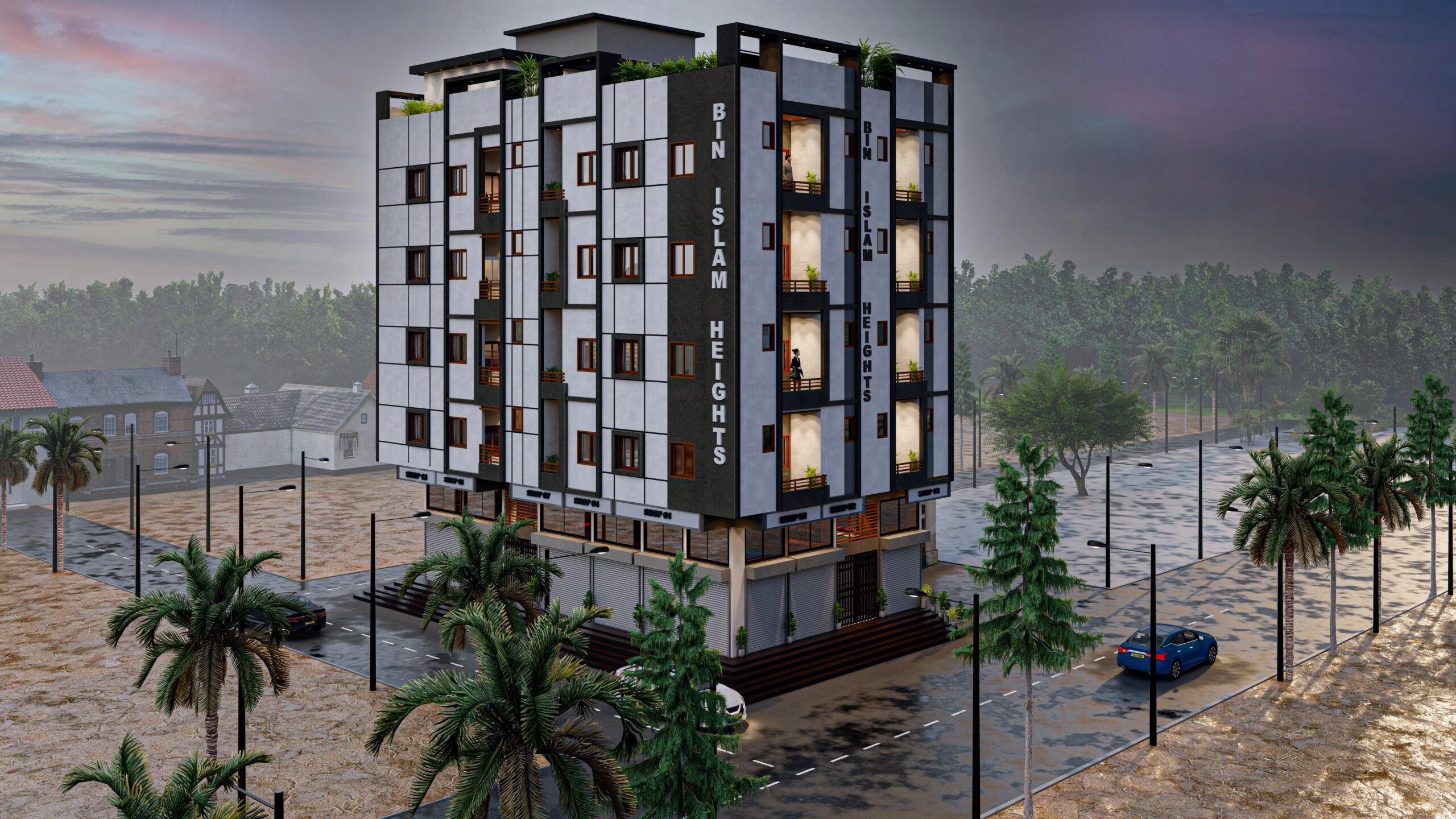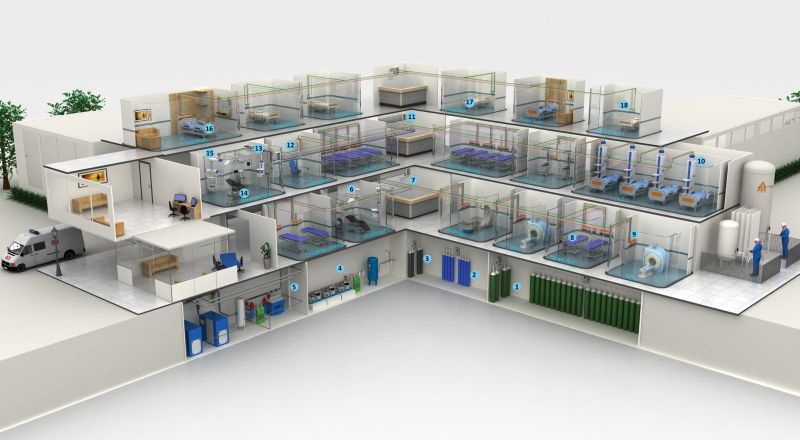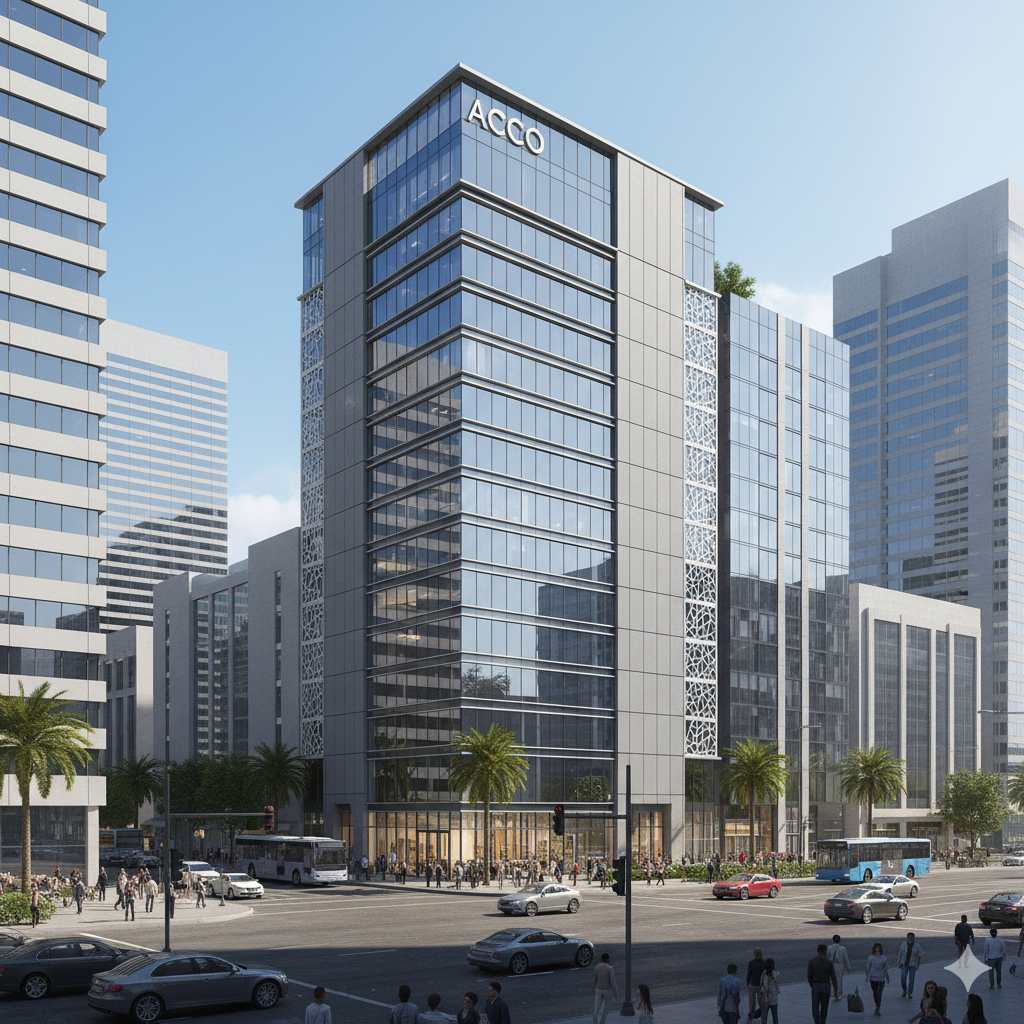
ACCO Innovative Healthcare Building Design Concepts in Pakistan: Leading the Way
| Main Heading | Subheadings |
|---|---|
| H1: Introduction to ACCO’s Role in Healthcare Design | 1. Overview of ACCO’s Influence in Pakistan’s Healthcare Sector 2. Importance of Innovative Design in Modern Healthcare |
| H2: Understanding the Need for Innovation in Healthcare Design | 1. Evolution of Healthcare Facilities in Pakistan 2. Impact of Technological Advancements on Healthcare Infrastructure 3. The Growing Demand for Patient-Centric Designs |
| H2: Key Features of ACCO’s Innovative Healthcare Designs | 1. Integration of Advanced Technology 2. Focus on Sustainability and Energy Efficiency 3. Patient-Centered Design Approaches 4. Modular and Flexible Spaces for Future Expansion |
| H2: Sustainability in Healthcare Buildings by ACCO | 1. Use of Green Building Materials 2. Energy-Efficient Systems and Renewable Energy Sources 3. Water Conservation and Waste Management Strategies |
| H2: The Role of Technology in ACCO’s Healthcare Design Concepts | 1. Smart Buildings and IoT in Healthcare 2. Telemedicine and Remote Monitoring Infrastructure 3. Automation and Robotics in Healthcare Facilities |
| H2: Patient Experience and Comfort: A Core Focus of ACCO’s Designs | 1. Designing for Patient Well-Being and Comfort 2. The Importance of Aesthetic Appeal in Healing 3. Noise Reduction and Acoustic Planning in Healthcare Facilities |
| H2: Case Studies: Successful ACCO Healthcare Projects in Pakistan | 1. Overview of Landmark Healthcare Projects by ACCO 2. Key Achievements and Innovations in These Projects 3. Lessons Learned and Future Directions |
| H2: Challenges in Implementing Innovative Healthcare Designs | 1. Regulatory and Compliance Challenges in Pakistan 2. Budget Constraints and Financial Planning 3. Balancing Innovation with Practicality in Design |
| H2: Collaboration with Healthcare Professionals | 1. Integrating Feedback from Healthcare Workers 2. Collaborative Design Process Between Architects and Medical Teams 3. Continuous Training and Adaptation to New Technologies |
| H2: Future Trends in Healthcare Design: ACCO’s Vision | 1. Predicting Future Healthcare Needs in Pakistan 2. Trends in Global Healthcare Design and Their Relevance to Pakistan 3. ACCO’s Roadmap for Future Projects |
| H2: Community Impact and Social Responsibility | 1. Designing Accessible Healthcare Facilities for All 2. Community Engagement and Education 3. Enhancing Public Health through Better Infrastructure |
| H2: The Economic Impact of ACCO’s Healthcare Projects | 1. Job Creation and Economic Growth 2. Enhancing Local Supply Chains 3. Long-Term Economic Benefits of Sustainable Healthcare Infrastructure |
| H2: The Importance of Cultural Sensitivity in Design | 1. Adapting Designs to Cultural and Regional Needs 2. Designing for Diverse Patient Populations 3. Incorporating Local Aesthetics into Modern Healthcare Design |
| H2: FAQs on ACCO’s Innovative Healthcare Building Design Concepts | 1. What makes ACCO’s healthcare designs stand out? 2. How does ACCO ensure sustainability in its projects? 3. What are the challenges in healthcare design in Pakistan? 4. How does ACCO incorporate technology into its designs? 5. What is ACCO’s approach to patient comfort and experience? 6. How does ACCO address budget constraints in innovative design? |
| H2: Conclusion: ACCO’s Role in Shaping the Future of Healthcare in Pakistan | 1. Summarizing ACCO’s Achievements and Vision 2. The Future of Healthcare Design in Pakistan 3. Final Thoughts on ACCO’s Contribution to Healthcare Infrastructure |
ACCO Innovative Healthcare Building Design Concepts in Pakistan: Leading the Way
Introduction to ACCO’s Role in Healthcare Design
ACCO, a pioneering force in Pakistan’s construction and design industry, has been instrumental in revolutionizing healthcare infrastructure across the country. With a commitment to integrating innovative design concepts that meet the evolving needs of the healthcare sector, ACCO stands at the forefront of shaping modern medical facilities in Pakistan. This article delves into ACCO’s groundbreaking healthcare building design concepts, highlighting their significance, challenges, and the way forward.
Overview of ACCO’s Influence in Pakistan’s Healthcare Sector
ACCO has consistently pushed the boundaries of traditional architecture, especially in the healthcare sector. Their influence extends beyond mere construction; they are redefining how healthcare facilities operate, focusing on efficiency, sustainability, and patient well-being. By aligning their designs with global standards, ACCO ensures that their projects not only meet but exceed the expectations of modern healthcare environments.
Importance of Innovative Design in Modern Healthcare
In today’s rapidly evolving medical field, healthcare facilities must be adaptable, patient-centered, and technologically advanced. Innovative design is crucial to accommodate these needs, ensuring that healthcare institutions can provide high-quality care while remaining functional and sustainable. ACCO’s approach to healthcare design emphasizes these aspects, setting new benchmarks in the industry.
Understanding the Need for Innovation in Healthcare Design
Evolution of Healthcare Facilities in Pakistan
The healthcare landscape in Pakistan has undergone significant changes over the past few decades. From basic medical centers to advanced hospitals, the evolution reflects a growing recognition of the need for specialized and sophisticated healthcare facilities. ACCO’s designs have been pivotal in this transformation, introducing new concepts that cater to the diverse healthcare needs of the population.
Impact of Technological Advancements on Healthcare Infrastructure
Technology has become a cornerstone of modern healthcare. From advanced diagnostic equipment to digital health records, the integration of technology into healthcare infrastructure has revolutionized how care is delivered. ACCO has embraced these technological advancements, incorporating them into their designs to create state-of-the-art facilities that enhance operational efficiency and patient outcomes.
The Growing Demand for Patient-Centric Designs
As healthcare becomes more patient-focused, the demand for designs that prioritize patient comfort, safety, and well-being has increased. ACCO’s approach to healthcare design is deeply rooted in understanding patient needs and creating environments that promote healing and recovery. This shift towards patient-centricity is a key driver of innovation in healthcare design.
Key Features of ACCO’s Innovative Healthcare Designs
Integration of Advanced Technology
ACCO’s healthcare designs are distinguished by the seamless integration of advanced technologies. From smart building systems that automate climate control and lighting to telemedicine infrastructure that supports remote consultations, ACCO ensures that their facilities are equipped to meet the demands of modern healthcare.
Focus on Sustainability and Energy Efficiency
In an era of increasing environmental awareness, sustainability has become a critical aspect of healthcare design. ACCO is committed to creating energy-efficient buildings that minimize environmental impact. This includes the use of renewable energy sources, energy-efficient HVAC systems, and sustainable building materials, ensuring that their projects contribute positively to the environment.
Patient-Centered Design Approaches
At the heart of ACCO’s design philosophy is the patient. Every aspect of their healthcare facilities is designed with the patient in mind, from the layout of rooms to the choice of materials and colors. This focus on patient-centered design not only improves patient satisfaction but also enhances the overall effectiveness of the healthcare facility.
Modular and Flexible Spaces for Future Expansion
Healthcare needs are constantly changing, and facilities must be able to adapt to new demands. ACCO incorporates modular and flexible design elements into their healthcare projects, allowing for easy expansion and reconfiguration as needed. This forward-thinking approach ensures that their facilities can evolve alongside advances in medical technology and patient care practices.
Sustainability in Healthcare Buildings by ACCO
Use of Green Building Materials
Sustainability begins with the materials used in construction. ACCO prioritizes the use of green building materials that reduce the environmental footprint of their projects. This includes materials that are locally sourced, recycled, or have low embodied energy, contributing to the overall sustainability of the healthcare facility.
Energy-Efficient Systems and Renewable Energy Sources
Energy efficiency is a cornerstone of ACCO’s sustainable design strategy. Their healthcare buildings are equipped with state-of-the-art energy management systems that optimize the use of electricity, heating, and cooling. Additionally, ACCO integrates renewable energy sources, such as solar panels, to reduce reliance on non-renewable energy and lower operating costs.
Water Conservation and Waste Management Strategies
ACCO’s commitment to sustainability extends to water conservation and waste management. Their designs incorporate rainwater harvesting systems, low-flow plumbing fixtures, and greywater recycling, ensuring that water resources are used efficiently. Waste management strategies include the separation and recycling of medical waste, reducing the environmental impact of healthcare operations.
The Role of Technology in ACCO’s Healthcare Design Concepts
Smart Buildings and IoT in Healthcare
Smart buildings, powered by the Internet of Things (IoT), are transforming the way healthcare facilities operate. ACCO leverages IoT technology to create intelligent systems that enhance the functionality of their buildings. These systems include automated lighting, climate control, and security, all of which can be monitored and managed remotely, improving operational efficiency.
Telemedicine and Remote Monitoring Infrastructure
The rise of telemedicine has underscored the need for healthcare facilities to support remote consultations and monitoring. ACCO’s designs include robust telemedicine infrastructure, enabling healthcare providers to offer remote services without compromising on the quality of care. This is particularly important in Pakistan, where access to healthcare can be challenging in remote areas.
Automation and Robotics in Healthcare Facilities
Automation and robotics are becoming increasingly important in healthcare, from automated medication dispensers to robotic surgery assistants. ACCO integrates these technologies into their designs, ensuring that their facilities are equipped to handle the demands of modern medical practices. This not only improves efficiency but also enhances patient safety and care quality.
Patient Experience and Comfort: A Core Focus of ACCO’s Designs
Designing for Patient Well-Being and Comfort
Patient well-being is at the core of ACCO’s healthcare designs. Every element, from the lighting to the furniture, is chosen to create a comfortable and calming environment. Natural light, soft colors, and ergonomic furniture are just a few of the features that contribute to a healing atmosphere, helping patients recover faster and more comfortably.
The Importance of Aesthetic Appeal in Healing
The aesthetic appeal of a healthcare facility plays a significant role in the healing process. ACCO understands the importance of creating spaces that are not only functional but also visually pleasing. Their designs often incorporate elements of nature, art, and architecture that uplift the spirit, providing a positive environment that supports both physical and emotional healing.
Noise Reduction and Acoustic Planning in Healthcare Facilities
Noise can be a significant source of stress for patients, particularly in hospitals. ACCO addresses this issue through careful acoustic planning, using sound-absorbing materials and designing layouts that minimize noise. This attention to detail ensures a quieter, more peaceful environment, which is crucial for patient recovery and comfort.
Case Studies: Successful ACCO Healthcare Projects in Pakistan
Overview of Landmark Healthcare Projects by ACCO
ACCO has been involved in several landmark healthcare projects across Pakistan, each showcasing their innovative approach to design. These projects range from large hospitals to specialized clinics, all of which have set new standards in the healthcare industry.
Key Achievements and Innovations in These Projects
Each of ACCO’s healthcare projects has introduced new design elements that address specific challenges in the Pakistani healthcare system. Innovations include the use of modular construction, integration of advanced medical technologies, and sustainable design practices that have significantly improved the functionality and efficiency of these facilities.
Lessons Learned and Future Directions
Through their extensive experience, ACCO has gained valuable insights into the challenges and opportunities of healthcare design in Pakistan. These lessons inform their future projects, ensuring that they continue to lead the way in creating innovative and effective healthcare environments.
Challenges in Implementing Innovative Healthcare Designs
Regulatory and Compliance Challenges in Pakistan
Implementing innovative healthcare designs in Pakistan comes with its own set of regulatory challenges. ACCO navigates these complexities by ensuring that their designs comply with local building codes, healthcare regulations, and international standards. This meticulous approach helps avoid delays and ensures that their projects are completed successfully.
Budget Constraints and Financial Planning
Budget constraints are a common challenge in healthcare projects, particularly in developing countries like Pakistan. ACCO addresses this by working closely with stakeholders to optimize designs for cost-effectiveness without compromising on quality. This includes the careful selection of materials, efficient construction practices, and value engineering to make the most of available resources.
Balancing Innovation with Practicality in Design
While innovation is key to advancing healthcare design, it must be balanced with practicality. ACCO ensures that their innovative concepts are not only cutting-edge but also practical and implementable. This involves close collaboration with healthcare professionals to ensure that the designs meet the real-world needs of medical staff and patients.
Collaboration with Healthcare Professionals
Integrating Feedback from Healthcare Workers
Healthcare workers are on the front lines of patient care, and their input is invaluable in the design process. ACCO actively involves healthcare professionals in their projects, gathering feedback on design elements to ensure that the facilities meet the needs of those who will be using them daily.
Collaborative Design Process Between Architects and Medical Teams
The success of ACCO’s healthcare projects lies in their collaborative approach. By working closely with medical teams, architects can design spaces that support efficient workflows, enhance patient care, and adapt to the evolving needs of the healthcare sector. This collaboration results in facilities that are both functional and innovative.
Continuous Training and Adaptation to New Technologies
The rapid pace of technological advancement in healthcare requires continuous learning and adaptation. ACCO ensures that their teams are up-to-date with the latest trends and technologies, providing ongoing training to stay ahead of the curve. This commitment to professional development enables them to incorporate the latest innovations into their designs effectively.
Future Trends in Healthcare Design: ACCO’s Vision
Predicting Future Healthcare Needs in Pakistan
As Pakistan’s population grows and ages, the demand for healthcare services will increase. ACCO is proactively addressing this by designing facilities that can accommodate future needs, including the expansion of services and the integration of new technologies. Their vision for the future includes creating adaptable, scalable healthcare environments that can evolve with the changing landscape.
Trends in Global Healthcare Design and Their Relevance to Pakistan
Global trends in healthcare design, such as the use of biophilic design, smart technology, and sustainable practices, are becoming increasingly relevant in Pakistan. ACCO is at the forefront of bringing these trends to the local market, adapting them to meet the unique needs and challenges of the Pakistani healthcare system.
ACCO’s Roadmap for Future Projects
Looking ahead, ACCO has a clear roadmap for future projects that includes expanding their portfolio of healthcare facilities, incorporating the latest innovations in design and technology, and continuing to set new standards in the industry. Their commitment to excellence and innovation ensures that they will remain leaders in healthcare design in Pakistan.
Community Impact and Social Responsibility
Designing Accessible Healthcare Facilities for All
Accessibility is a key consideration in ACCO’s healthcare designs. They are committed to creating facilities that are accessible to all, including individuals with disabilities and those in underserved communities. This involves designing spaces that are easy to navigate, with features such as ramps, wide corridors, and accessible restrooms.
Community Engagement and Education
ACCO believes in the power of community engagement to create healthcare facilities that truly serve the needs of the population. They actively involve local communities in the design process, gathering input and educating them on the benefits of innovative healthcare infrastructure. This ensures that their projects are not only functional but also accepted and supported by the communities they serve.
Enhancing Public Health through Better Infrastructure
By designing state-of-the-art healthcare facilities, ACCO is directly contributing to the improvement of public health in Pakistan. Their projects provide the infrastructure needed to deliver high-quality medical care, reduce the spread of diseases, and improve health outcomes for the population. This social responsibility is a driving force behind their commitment to excellence in healthcare design.
The Economic Impact of ACCO’s Healthcare Projects
Job Creation and Economic Growth
ACCO’s healthcare projects are not only beneficial to public health but also to the economy. These projects create numerous jobs, from construction workers to healthcare professionals, boosting local employment and contributing to economic growth. The ripple effect of these projects extends to various sectors, including manufacturing, transportation, and services.
Enhancing Local Supply Chains
By sourcing materials and services locally whenever possible, ACCO supports local businesses and strengthens supply chains. This approach not only reduces costs and lead times but also promotes economic development in the regions where they operate. The focus on local procurement is part of ACCO’s broader strategy to contribute to the economic well-being of the communities they serve.
Long-Term Economic Benefits of Sustainable Healthcare Infrastructure
Sustainable healthcare infrastructure offers long-term economic benefits by reducing operational costs, improving efficiency, and increasing the lifespan of facilities. ACCO’s commitment to sustainability ensures that their projects deliver value not only in the short term but also in the long term, making them a sound investment for the future.
The Importance of Cultural Sensitivity in Design
Adapting Designs to Cultural and Regional Needs
Cultural sensitivity is crucial in healthcare design, particularly in a diverse country like Pakistan. ACCO’s designs are tailored to reflect the cultural and regional needs of the communities they serve. This includes respecting local customs, traditions, and religious practices, ensuring that the facilities are welcoming and comfortable for all patients.
Designing for Diverse Patient Populations
Pakistan’s diverse population requires healthcare facilities that cater to a wide range of needs. ACCO’s designs incorporate features that accommodate different patient groups, including women, children, and the elderly. By considering the specific needs of these populations, ACCO creates inclusive environments that provide high-quality care to all.
Incorporating Local Aesthetics into Modern Healthcare Design
While ACCO embraces modern design principles, they also recognize the importance of incorporating local aesthetics into their healthcare projects. This blending of traditional and contemporary design elements creates facilities that are not only functional but also resonate with the cultural identity of the region. This approach helps to preserve local heritage while advancing healthcare infrastructure.
FAQs on ACCO’s Innovative Healthcare Building Design Concepts
1. What makes ACCO’s healthcare designs stand out?
ACCO’s healthcare designs stand out due to their emphasis on innovation, sustainability, and patient-centered care. They incorporate advanced technologies, focus on energy efficiency, and prioritize the comfort and well-being of patients, setting new standards in the industry.
2. How does ACCO ensure sustainability in its projects?
ACCO ensures sustainability by using green building materials, integrating energy-efficient systems, and implementing water conservation and waste management strategies. Their designs are geared towards reducing the environmental impact of healthcare facilities while optimizing operational efficiency.
3. What are the challenges in healthcare design in Pakistan?
The challenges in healthcare design in Pakistan include navigating regulatory and compliance issues, managing budget constraints, and balancing innovation with practicality. ACCO addresses these challenges through meticulous planning, collaboration with stakeholders, and a commitment to quality and sustainability.
4. How does ACCO incorporate technology into its designs?
ACCO incorporates technology into its designs by integrating smart building systems, telemedicine infrastructure, and automation technologies. These innovations enhance the functionality, efficiency, and safety of healthcare facilities, ensuring they are equipped to meet the demands of modern healthcare.
5. What is ACCO’s approach to patient comfort and experience?
ACCO’s approach to patient comfort and experience involves designing spaces that promote well-being and healing. This includes the use of natural light, calming colors, ergonomic furniture, and noise reduction strategies, all of which contribute to a positive patient experience.
6. How does ACCO address budget constraints in innovative design?
ACCO addresses budget constraints by optimizing designs for cost-effectiveness, selecting materials and construction methods that offer the best value, and working closely with stakeholders to ensure that projects are completed within budget without compromising on quality or innovation.
Conclusion: ACCO’s Role in Shaping the Future of Healthcare in Pakistan
Summarizing ACCO’s Achievements and Vision
ACCO has established itself as a leader in healthcare design in Pakistan, consistently delivering innovative, sustainable, and patient-centered facilities. Their commitment to excellence has not only transformed the healthcare landscape but also set new benchmarks for the industry.
The Future of Healthcare Design in Pakistan
The future of healthcare design in Pakistan is bright, with ACCO leading the way in adopting global trends and integrating cutting-edge technologies. As the demand for modern healthcare facilities continues to grow, ACCO is well-positioned to meet these needs with designs that are both forward-thinking and culturally sensitive.
Final Thoughts on ACCO’s Contribution to Healthcare Infrastructure
ACCO’s contribution to healthcare infrastructure in Pakistan is undeniable. Through their innovative designs and commitment to sustainability, they are not only improving healthcare outcomes but also enhancing the quality of life for countless individuals. As they continue to lead the way in healthcare design, ACCO is poised to shape the future of healthcare in Pakistan for years to come.




